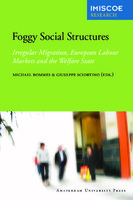Foggy Social Structures
Irregular Migration, European Labour Markets and the Welfare State
Contributor(s)
Bommes, Michael (editor)
Sciortino, Giuseppe (editor)
Language
EnglishAbstract
Irregular migration systems are giving way to an undocumented population in Europe that is estimated at some millions. The migrants manage to live and work for years without a certified identity yet within 'foggy' social structures. What strategies and mechanisms allow them to avoid detection, generate an income and access necessary services? What alternatives are pursued - at whatever human cost - to substitute for political membership and legal protection? How does irregular status impact social interactions? Based on empirical studies carried out across the Continent, this book explores how irregular migration systems developed over time to interact with changing European labour markets, welfare regimes and immigration policies. Foggy Social Structures considers such phenomena one of contemporary society's distinctive features, one that challenges existing notions of political statehood and societal membership. Europese landen kampen met allerlei vormen van illegale migratie met als gevolg dat miljoenen mensen leven en werken zonder geldige identiteitspapieren. Hoe komen zij aan inkomen en andere voorzieningen en zorgen zij ervoor dat ze niet worden getraceerd? Wat is de invloed van illegaliteit op hun sociale interactie? Foggy Social Structures beschrijft de wijze waarop illegale migratiesystemen zich hebben ontwikkeld, tegen het licht van de veranderingen in de Europese arbeidsmarkten, het immigratiebeleid en het verzorgingsstelsel.
Keywords
sociology; sociologieDOI
10.26530/OAPEN_401761ISBN
9789089643414OCN
755745949Publisher
Amsterdam University PressPublisher website
https://www.aup.nl/Publication date and place
2011Classification
Migration, immigration and emigration
Relating to migrant groups / diaspora communities or peoples
Sociology and anthropology


 Download
Download